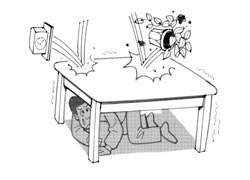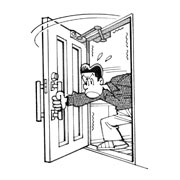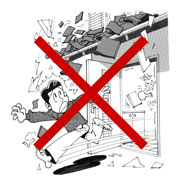One never knows when, where or on what scale an earthquake may strike. It is a good idea to be mentally prepared at all times so that you can remain calm and take proper action in times of an emergency.
 |
First of all, protect yourself. |
 |
 |
Do not go near gates or walls. |
| |
 Your life is the most important thing of all, so first protect yourself. Your life is the most important thing of all, so first protect yourself. |
|
|
When outside, beware of structures and other items that may collapse or topple over, such as brick walls and vending machines.
|
| |
|
|
|
|
 |
Turn off all sources of heat.
|
|
 |
Cooperate with others when conducting rescue and first aid activities. |
| |
 Calmly turn off all sources of heat, such as appliances for cooking and heating. Calmly turn off all sources of heat, such as appliances for cooking and heating.
|
|
|
Check on the elderly, the disabled and the injured and be ready to help each other. |
| |
|
|
|
|
 |
Secure an exit by opening a door.
|
|
 |
Conduct a safety check before evacuating.
|
| |
 Concrete buildings, particularly condominiums, tend to tilt, making it impossible to open the door. Therefore, secure a means of escape by opening the door. Concrete buildings, particularly condominiums, tend to tilt, making it impossible to open the door. Therefore, secure a means of escape by opening the door. |
|
|
Before evacuating your building, switch off the electric circuit breaker and shut off the main gas valve. |
| |
|
|
|
|
 |
If a fire breaks out, try to extinguish it first.
|
|
 |
Evacuate on foot and carry a minimum of belongings. |
| |
Shout, “Kaji da!” (Fire!) to alert your neighbors and ask for their help in extinguishing the fire during its early stages. |
|
|
Evacuate on foot to the designated evacuation site. Do not use your car or motorcycle. |
| |
|
|
|
|
 |
Do not panic when escaping outside.
|
|
 |
Follow official announcements. |
| |
 Beware of falling materials, such as signs and glass from windows, and remain calm. Beware of falling materials, such as signs and glass from windows, and remain calm. |
|
|
 Listen to official announcements on the radio or TV and do not be influenced by rumors or hearsay. Listen to official announcements on the radio or TV and do not be influenced by rumors or hearsay. |
| |
|
|
|
|
 |
|
 |


 Your life is the most important thing of all, so first protect yourself.
Your life is the most important thing of all, so first protect yourself. Calmly turn off all sources of heat, such as appliances for cooking and heating.
Calmly turn off all sources of heat, such as appliances for cooking and heating. Concrete buildings, particularly condominiums, tend to tilt, making it impossible to open the door. Therefore, secure a means of escape by opening the door.
Concrete buildings, particularly condominiums, tend to tilt, making it impossible to open the door. Therefore, secure a means of escape by opening the door. Beware of falling materials, such as signs and glass from windows, and remain calm.
Beware of falling materials, such as signs and glass from windows, and remain calm. Listen to official announcements on the radio or TV and do not be influenced by rumors or hearsay.
Listen to official announcements on the radio or TV and do not be influenced by rumors or hearsay.